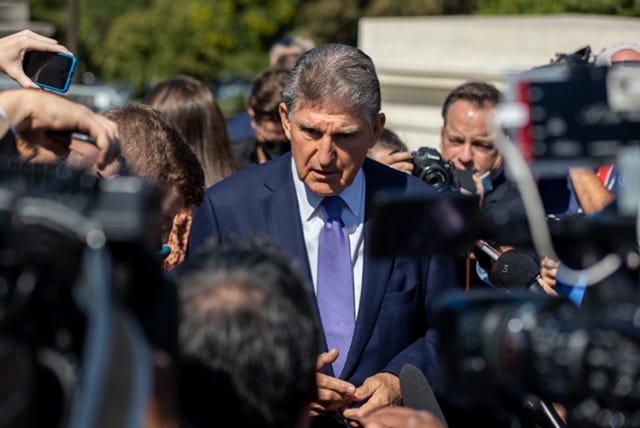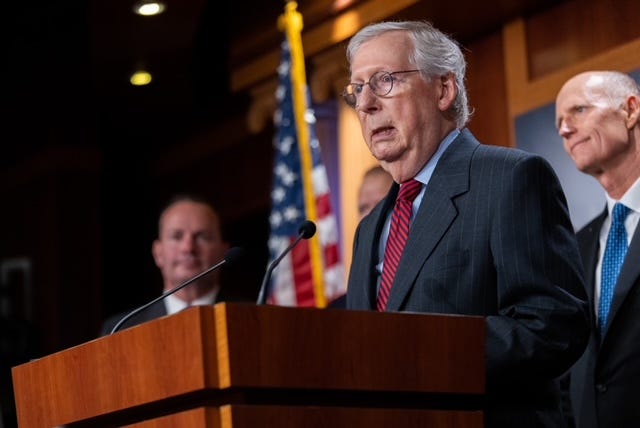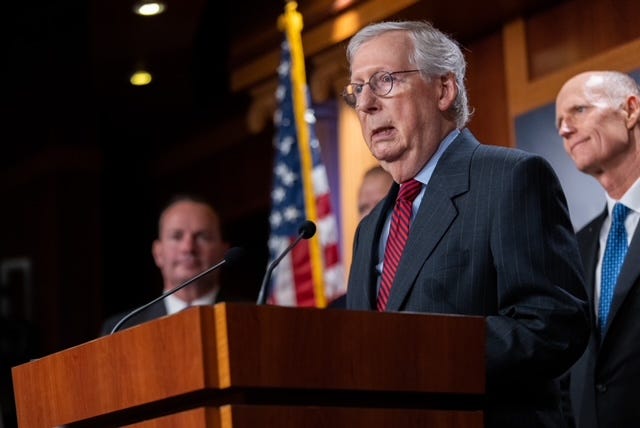Wake Up To Politics - October 4, 2021
Wake Up To Politics: What can be done about the debt ceiling?
Good morning! It’s Monday, October 4, 2021. Election Day 2024 is 1,128 days away. Election Day 2022 is 400 days away. The debt ceiling deadline is 14 days away.
Spending talks: Democrats regroup as distrust grows within the party
After a long and suspenseful week, House members went home Friday without voting on the bipartisan infrastructure package. The delay was a blow to moderates, who had secured a promise from Speaker Nancy Pelosi (D-CA) that a vote would be held last week, and a victory for progressives, who stuck together to stare down their party’s leadership in a major show of strength.
The intramural standoff was eventually ended with a trip by President Joe Biden to the Hill on Friday, when Biden sided with progressives in deeming his two main priorities — the infrastructure package and a separate Democratic spending package — linked together.
While progressives may have been last week’s big winners, moderates also extracted a significant concession. In the same closed-door speech, Biden told House Democrats that the reconciliation package would likely have to be shrunken down to a $2 trillion price tag over 10 years, as opposed to the $3.5 trillion sought by liberals.
That means Democrats now have to reset their spending talks, and make some tough choices about how to trim their sweeping social agenda: do they keep all of the programs in their current proposal but cut their longevity and scope, or do they go all-in on a few programs and execute those to their fullest extent?
As last week showed, with three Democratic votes to spare in the House and none in the Senate, every Democratic lawmaker has leverage. In particular, all eyes will remin on centrist Sens. Joe Manchin (D-WV) and Kyrsten Sinema (D-AZ), perhaps the two Democrats most willing to buck their party leadership. Pressure is rising especially on Sinema, who faces progressive anger back home and rumors of a primary challenge.

Frustration and distrust are rampant among congressional Democrats as they head into a new phase of negotiations. Moderates feel burned after Pelosi broke her promise to hold an infrastructure vote, a decision Sinema called “inexcusable” and “deeply disappointing.”
Progressives have responded in kind, such as this tweet from Rep. Alexandria Ocasio-Cortez (D-NY) clearly aimed at the new self-styled maverick from Arizona: “There really isn’t anything maverick, innovative, or renegade about being a politician that works with corporate lobbyists to protect the rich, short-shrift working families, and preserve the status quo.”
It will be up to Biden, Pelosi, and Senate Majority Leader Chuck Schumer (D-NY) to repair the breach — while also searching for a way to raise the debt ceiling and stave off a historic default. Biden is slated to host lawmakers at the White House this week to continue negotiations, while also traveling the country in a bid to rally public support for his agenda.
When are Democrats hoping to have their two legislative packages on Biden’s desk? The new deadline is October 31, largely because that is the new expiration date for a slew of surface transportation programs that are renewed in the bipartisan infrastructure bill. Pelosi identified the Halloween deadline in a letter to House Democrats on Saturday, stressing that both bills must be passed by then.
Pelosi also included the phrase “It’s about time” in her letter no less than five times, a sign of just how much urgency Democrats feel in their current legislative push ahead of a looming midterm year that could cost the party their razor-thin majorities.

Debt ceiling: What the U.S. can do to avoid a catastrophic default
If the U.S. doesn’t raise the debt ceiling in the next two weeks, the country is headed towards an unprecedented default that could wipe out 6 million American jobs and trigger a global financial crisis.
Wake Up To Politics economic contributor Davis Giangiulio writes in with the options policymakers have to handle the debt limit:
The first option Congress has is to pass a “clean” debt ceiling suspension, without anything else attached. The House passed such a bill on Wednesday, and the Senate plans to take it up today. But 10 Republican votes will be needed to end a filibuster, and the Senate GOP has made clear they plan to block the measure from advancing.
The second major option is for Democrats to pass the debt ceiling hike through the reconciliation process, which requires only a simple majority in the Senate. This could either be a stand-alone reconciliation process or attached to the current reconciliation bill being debated. According to Punchbowl News, the Senate parliamentarian has ruled that Democrats could create a new reconciliation “track” for a debt ceiling increase that doesn’t impact the ongoing process.
Democrats are wary of using the length reconciliation process to raise the debt ceiling, which Senate Minority Leader Mitch McConnell (R-KY) is pushing them to do. Senate Majority Whip Dick Durbin (D-IL) called it a “non-starter,” arguing that there simply is not enough time to add or create a new reconciliation process for the debt ceiling with the deadline so close. However, many Democrats increasingly recognize reconciliation as their most realistic option to avoid default.
What else could Congress do? It could get rid of the debt ceiling altogether. Treasury Secretary Janet Yellen told Congress she would support doing away with the limit entirely. Many experts see the debt ceiling as an antiquated quirk that only leads to the country’s fiscal security being held hostage for political reasons in Congress. However, a bill to eliminate the debt ceiling would likely also face a Senate filibuster, making it unlikely to advance.

What about the executive branch? One option that has some support is minting a $1 trillion coin to ignore the debt ceiling and allow the country to pay its bills without congressional approval more spending power in one fell swoop. A 1996 law gives the Treasury the ability to mint platinum coins as it sees fit, opening the door to this option. Although it remains a long shot, the White House has reportedly considered it as a way to act if Congress fails to.
One last possible option is for the president to ignore the debt ceiling altogether. The 14th Amendment states that “the validity of the public debt of the United States, authorized by law… shall not be questioned.” Some have interpreted that as meaning the debt ceiling is unconstitutional, and the Treasury can go ahead and issue debt whenever it needs to.
Speaker Nancy Pelosi even encouraged then-President Barack Obama to ignore the debt limit in 2013 during a similar fight. Although the constitutionality of such an act would undoubtedly be challenged, some observers have pointed out that it’s unclear just who would have the legal standing to sue the president in these uncharted waters.
Lawmakers have yet to settle on an escape route for the debt limit, but they don’t seem all that anxious about it. “We’re gonna get this done,” Durbin confidently declared last week. McConnell, who has all but removed himself from the process, seemed equally optimistic that Democrats would find a way out of the quagmire — alone. “His responsibility is to raise the debt ceiling,” McConnell said of his Democratic counterpart, Chuck Schumer. “And trust me, he will do it.”

Daybook
All times Eastern, unless otherwise noted.
WHITE HOUSE
President Joe Biden will start his day at his home in Wilmington, Delaware. At 9:35 a.m., he will depart for Washington, D.C., touching down at 10:30 a.m. at the White House. Finally, at 11:15 a.m., Biden will deliver remarks on the debt ceiling. (Watch Biden’s speech here.)
White House Press Secretary Jen Psaki will hold her daily press briefing at 1 p.m.
CONGRESS
The Senate will convene at 3 p.m. and resume consideration of S. 1301, which is technically titled the “Promoting Physical Activity for Americans Act,” but is being used as the vehicle for the legislation to suspend the debt ceiling through December 2022. The bill, which passed the House in a 219-212 vote last week, is expected to be defeated by a Republican filibuster.
At 5:30 p.m., the Senate will resume consideration of Jonathan Meyer’s nomination to be General Counsel of the Department of Homeland Security. (Watch the Senate’s session here.)
The House is out for two straight “Committee Work Weeks,” meaning the chamber is not scheduled to hold any votes until October 19 (after the projected debt ceiling deadline).
COURTS
The Supreme Court is back for the first day of oral arguments of its new term. The court is returning for its first in-person oral arguments in more than 18 months; the arguments will not be open to the public, but a live audio feed will be posted.
At 10 a.m., the justices will hear oral arguments in Mississippi v. Tennessee, in which Mississippi is suing Tennessee for allegedly stealing groundwater from an aquifer the two states share. (Listen here.)
At 11 a.m., the justices will hear oral arguments in Wooden v. United States, which asks whether James Wooden, a Georgia man who broke into a storage facility and stole from 10 separate storage units, committed ten felonies “on occasions different from one another” or just one. (Listen here.)
Thanks for waking up to politics! If you enjoy reading this newsletter, I’d be so grateful if you’d consider donating to help support me and my work. If you want to show off your support for Wake Up To Politics, you can also buy some merchandise.
Also: don’t forget to tell your friends and family to sign up for the newsletter using your unique referral link. And if you have any questions or comments, feel free to email me at any time.



